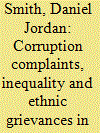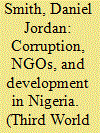| Srl | Item |
| 1 |
ID:
133427


|
|
|
|
|
| Publication |
2014.
|
| Summary/Abstract |
Based on anthropological field work in southeastern Nigeria, this paper explores the public concerns and everyday experience of corruption in a society still living with the legacies of the Biafran secession attempt. The paper shows how the revival of Igbo nationalism and resentment over perceived marginalisation is fuelled by perceptions that the corrupt machinery of the federal government runs against the interests of the Igbo people, and funnels resources away from the southeast as punishment for the failed separatist struggle more than 40 years ago. Hence, complaints about corruption are used to critique the Nigerian state and other regional or ethnic groups, but they also figure in an internally focused critique by Igbos of their own complicity in Nigeria's endemic corruption.
|
|
|
|
|
|
|
|
|
|
|
|
|
|
|
|
| 2 |
ID:
134290


|
|
|
|
|
| Summary/Abstract |
Based on anthropological field work in southeastern Nigeria, this paper explores the public concerns and everyday experience of corruption in a society still living with the legacies of the Biafran secession attempt. The paper shows how the revival of Igbo nationalism and resentment over perceived marginalisation is fuelled by perceptions that the corrupt machinery of the federal government runs against the interests of the Igbo people, and funnels resources away from the southeast as punishment for the failed separatist struggle more than 40 years ago. Hence, complaints about corruption are used to critique the Nigerian state and other regional or ethnic groups, but they also figure in an internally focused critique by Igbos of their own complicity in Nigeria’s endemic corruption.
|
|
|
|
|
|
|
|
|
|
|
|
|
|
|
|
| 3 |
ID:
095057


|
|
|
|
|
| Publication |
2010.
|
| Summary/Abstract |
This article examines corruption in Nigeria's development sector, particularly in the vastly growing arena of local non-governmental organisations (NGOs). Grounded in ethnographic case studies, the analysis explores why local NGOs in Nigeria have proliferated so widely, what they do in practice, what effects they have beyond their stated aims, and how they are perceived and experienced by ordinary Nigerians. It shows that even faux NGOs and disingenuous political rhetoric about civil society, democracy, and development are contributing to changing ideals and rising expectations in these same domains.
|
|
|
|
|
|
|
|
|
|
|
|
|
|
|
|
| 4 |
ID:
179123


|
|
|
|
|
| Summary/Abstract |
Preachers of the prosperity gospel in Nigeria criticise politicians’ greed and government corruption, even as many church leaders amass great wealth themselves. Drawing on ethnographic research, this article explores the relationship between Pentecostalism's prosperity gospel and political culture in Nigeria, especially as it pertains to problems of inequality and corruption. The analysis builds on a case study of one particular prosperity church in the city of Umuahia. It addresses the paradox that this brand of Pentecostalism articulates widespread discontent with the venality plaguing national political culture, while at the same time offering divine justification for the pursuit and accumulation of wealth. Examining not only Pentecostals’ interpretations of corruption, but also people's responses to scandals within these churches, the paper attempts to understand why Nigerians who are so aggrieved about corruption and inequality are at the same time drawn to churches that appear to reproduce many of the same dynamics.
|
|
|
|
|
|
|
|
|
|
|
|
|
|
|
|